
A lottery is an arrangement in which prizes are awarded by chance. Prizes may consist of money, goods, or services. Modern lotteries are often used for military conscription, commercial promotions in which property is given away randomly, and the selection of juries from lists of registered voters. There are also many games of chance, such as roulette and poker, which can be considered lotteries. However, there is a distinction between the gambling type of lottery and other types in which participants must pay a consideration to have the opportunity to win a prize. For example, the American Continental Congress in 1776 voted to establish a lottery to raise funds for the Revolution; this was not a traditional gambling lottery and was not a success. Public lotteries were, however, very popular in colonial America and played a significant role in raising money for both private and public uses. Many public lotteries financed roads, canals, libraries, churches, colleges, and other facilities.
It is possible to profit from playing lottery, but you must understand the rules of probability and make a careful choice. You must avoid superstitions, hot and cold numbers, quick picks, and other irrational betting systems. The best way to pick lottery numbers is to calculate all the combinations and make a rational choice based on this information. You can use a tool like Lotterycodex to help you with this process.
You can also join a syndicate to increase your chances of winning. This is a sociable way to play and will cost you less per ticket. However, a small winning amount is unlikely to change your life dramatically, so only gamble with money that you can afford to lose.